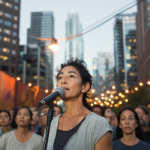In 2019, a robust 62% of Americans believed immigrants were an asset to the country, bringing hard work, talent, and a fresh dynamism to the economy and culture. Fast forward to 2024, and the tone has shifted. The number of Americans who view immigrants as a source of national strength has notably declined, sparking debates across the political and social spectrum. What has changed in just five short years, and why has the public perception of immigrants shifted so dramatically?
1. Economic Anxiety Post-Pandemic
The COVID-19 pandemic left an indelible mark on the U.S. economy. While immigrants have historically been seen as economic drivers, the post-pandemic reality has heightened fears about job security and competition. Many Americans, still recovering from economic disruptions, now view immigrants as potential competitors for scarce resources rather than contributors to economic growth. With inflation, supply chain issues, and rising living costs, immigration has become an easy scapegoat for broader systemic issues.
2. Political Polarization and Media Influence
In 2019, despite a divided political climate, many Americans still saw the value immigrants bring to the nation. However, the past few years have seen a sharp increase in anti-immigrant rhetoric from influential political figures and media outlets. This messaging often plays on fears of crime, cultural erosion, and economic displacement. Misinformation campaigns have capitalized on these anxieties, shifting the narrative from one of inclusion to one of exclusion.
3. Increased Focus on Border Issues
The U.S. southern border has long been a flashpoint in the immigration debate, but recent surges in migrant crossings and high-profile incidents have dominated headlines. Coverage of strained resources, overwhelmed border patrol agents, and humanitarian crises has painted a more chaotic picture of immigration. For many Americans, this has reframed the immigration debate from one of opportunity to one of crisis.
4. Shifting Demographics and Cultural Concerns
As the U.S. becomes more ethnically and racially diverse, some Americans have expressed fears about losing their cultural identity. This concern, often stoked by nationalist movements, has created resistance to immigration, particularly from non-European countries. The growing visibility of immigrant communities in local politics, business, and media has fueled unease among those who feel their way of life is being challenged.
5. Security Fears in a Time of Uncertainty
Global instability, from wars to climate change, has increased the number of asylum seekers and refugees looking to the U.S. for safety. While America has long prided itself on being a refuge for those in need, security concerns have heightened. Fears around terrorism, gang violence, and crime—often linked, unfairly, to immigrant communities—have compounded the negative perceptions.





No responses yet